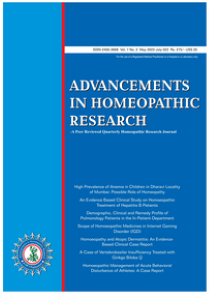Is Homoeopathy a Placebo - A Review
Keywords:
Homoeopathy, (NHIS), Integrative medicine, meta-analyses, systematic reviewsAbstract
Background -Integrative medicine (IM) refers to all those treatments that are not part of conventional healthcare. Homeopathy is a system of IM that was developed in Europe at the end of the eighteenth century employing medicines prepared according to a well-defined procedure starting from mineral, herbal or animal substances. Homeopathic remedies are substances prescribed in extremely low doses (or high dilutions/ dynamizations, also known as “potencies”) to treat the same specific syndromes they are known to cause in overdose, by mimicking and augmenting the patient’s immune response and natural defences Moreover, observational data from real-life homeopathic practice are becoming increasingly useful to evaluate the role of this type of IM in treating a wide range of chronic and acute diseases. These results should not be underestimated, also because any gain in health offered by homeopathic medicine, alone or in combination with standard medicine, could be considered of value to the healthcare system in managing the yearly seasonal epidemics that cause RTIs each winter. During the observation period, patients treated with the homeopathic medicine had a lower number of respiratory tract infection episodes than untreated patients.Despite its controversial nature, clinical use of homeopathy has risen steadily in recent years, encouraged by the fact that some of its mechanisms of action have been elucidated and described in randomized controlled trials, meta-analyses or systematic reviews [1-2].




